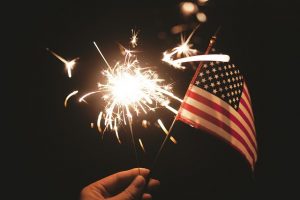 The American traditions of parades, cookouts, and fireworks help us celebrate the summer season, especially our nation’s birthday on the Fourth of July. However, fireworks can turn a joyful celebration into a painful memory when children and adults are injured or killed while using fireworks.
The American traditions of parades, cookouts, and fireworks help us celebrate the summer season, especially our nation’s birthday on the Fourth of July. However, fireworks can turn a joyful celebration into a painful memory when children and adults are injured or killed while using fireworks.
Although legal consumer fireworks that comply with U.S. Consumer Product Safety Commission (CPSC) regulations can be relatively safe when used responsibly, all fireworks, by their nature, are hazardous and can cause injuries. Fireworks are classified as hazardous substances under the Federal Hazardous Substances Act (FHSA). Some fireworks, such as illegal firecracker-type devices (M-80s, quarter sticks) and professional display fireworks should never be handled by consumers, due to the risk of serious injury and death.
CPSC estimates that in 2017, about 12,900 people were treated in hospital emergency rooms for injuries associated with fireworks. Sixty-seven percent of these estimated injuries occurred in a one-month special study period (June 16, 2017 – July 16, 2017) around July 4. Most of the injuries involved hands and fingers, the head (including face, eyes, and ears), legs and arms. Children under the age of 15 years old accounted for 36 percent of the estimated injuries. Fireworks should be used only with extreme caution.
Before using fireworks, make sure they are permitted in your state or local area. Regardless of location, consumers who intend to use fireworks must comply with federal regulations.
To help consumers use fireworks more safely, the CPSC offers these recommendations:
- Do not allow young children to play with fireworks. Sparklers, a firework often considered by many to be the ideal “safe” device for the young, burn at very high temperatures and should be not be handled by young children. Children may not understand the danger involved with fireworks and may not act appropriately while using the devices or in case of emergency.
- Older children should be permitted to use fireworks only under close adult supervision. Do not allow any running or horseplay.
- Set off fireworks outdoors in a clear area, away from houses, dry leaves, or grass and other flammable materials.
- Keep a bucket of water nearby for emergencies and for pouring on fireworks that fail to ignite or explode.
- Do not try to relight or handle malfunctioning fireworks. Soak them with water and throw them away.
- Be sure other people are out of range before lighting fireworks.
- Never light fireworks in a container, especially a glass or metal container.
- Keep unused fireworks away from firing areas.
- Store fireworks in a cool, dry place.
- Check instructions for special storage directions.
- Observe local laws.
- Never have any portion of your body directly over a firework while lighting.
- Do not experiment with homemade fireworks.
Source: https://www.cpsc.gov
If you have other ideas, we’d love to hear from you at safety@kemi.com!

